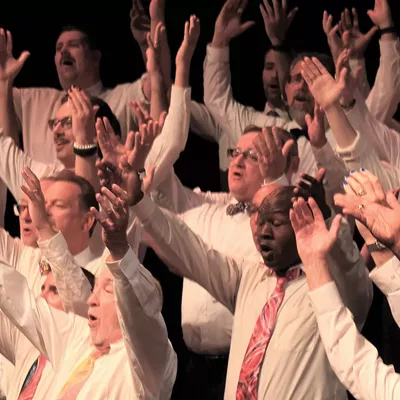In my other life as a writing instructor, I recently had my students read Sure Thing, the first in David Ives' collection of short plays, All in the Timing.
After having just graded a number of papers about his work, I went to Arizona Onstage's production of All in the Timing a little sick of Ives. But the company—luckily—provides an engaging version of Ives' particular brand of surreal yet simple comedy. The charming evening plays out in short, fast-paced bursts of strange humor.
Arizona Onstage has recruited three directors to helm the six absurdist miniplays (each director takes two) as well as a cast of 10 actors, some of whom have multiple roles.
Carrie Hill directs the evening's first play (and All in the Timing's most famous), Sure Thing. A young woman named Betty (Rhonda Hallquist) sits quietly in a cafe. When a young man named Bill (Jonathan Northover) tries to start a flirtatious conversation, she shuts him down.
But when an offstage bell rings, Bill gets another chance. In a fantasy twist we've all wished for in real life, Bill and Betty get an immediate "do over" every time they say something wrong.
Northover is a delight to watch, providing a range of deliveries for all of Bill's alternate lines. Strangely, Hallquist—an adept comic actor elsewhere—is miscast as Betty. She plays the absurd situation in too quiet a key, and she can't quite keep up with Northover's energy.
However, both actors return in triumph in Words, Words, Words, also directed by Hill. Joined by actor Carley Preston, they play monkeys who must sit at typewriters and randomly press keys until they come up with the script of Hamlet.
Each of the three actors give their monkey a hilariously distinct character. Preston's is a hardened journalist; Northover's is a would-be revolutionary who wants to escape. Hallquist's monkey is just very confused.
As strange as this may sound, Words is not the oddest play of the night. That designation actually goes to two works, Universal Language and Philip Glass Buys a Loaf of Bread, the most abstract pieces in All in the Timing.
Universal Language takes place almost entirely in a made-up language, Unamunda. And Philip Glass satirizes the real-life composer's repetitive, minimalist compositions: The characters repeat the same lines over and over, in the process creating a layered, Glass-like musical effect.
Both plays are directed by Eva Tessler. She's a dance teacher, and her experience with movement is obvious in her tight direction of these two challenging pieces. In both, the actors have to rely on body language as well as nonsense sounds to get their meaning across. There's even a nifty little dance sequence in Philip Glass.
Two of the actors in Philip Glass, Barbara Ann "Bebe" Fischer and Samantha Cormier, must be complimented on their lovely singing. Actors don't necessarily need to sing that well to do the play, but these women's operatic voices—as well as the efforts of music director Lyle Brown—create surprisingly beautiful effects.
Sheldon Metz directs Philadelphia, a simple piece that equates various cities with states of mind. "Philadelphia" is a state where nothing goes your way. Like many of All in the Timing's pieces, the humor comes from making an abstract idea literal.
Metz closes the evening with Variations on the Death of Trotsky, which takes the bell-ringing, do-over structure of Sure Thing and applies to it to the demise of the Russian revolutionary.
Trotsky (Jared Stokes) is sitting in his study with an ax in his head. His wife, played by Cormier, points out that—according to an encyclopedia— today is the day of his death. Variants on this situation play out over and over, and Trotsky dies every time the bell rings.
This macabre work ends the night on a slightly melancholy, reflective note, though its black humor is still tremendously funny.
All six plays take place in the same space, and director Metz and actor Cormier, doing double-duty as scenic designers, provide a backdrop for the evening that's impressive in scope and execution. A reproduction of the interlocking gears of a clock hangs at the back of the stage, a visual motif that reflects the "timing" that tentatively holds the six plays together.
It's beautiful, but the play could operate perfectly well without it, and I wonder why the company went to so much trouble. Likewise, an elaborate tire swing added for Words, Words, Words is used exactly once, for about five seconds.
Ives composed Timing in pieces between 1987 and 1993, and Arizona Onstage has updated it a bit, inserting references to iPads, for instance, and to the year 2013. But some of it still feels dated.
Philip Glass, for example, was a bigger deal in 1993 than he is now. However, you don't need to know Glass' music to find the play funny, any more than you have to know the infinite monkey theorem, which inspired Words, Words, Words. The appeal of Ives' strange humor is that it transcends its intellectual references, in the way that the best comedy does.
In short, even those who have already seen it or read it—including instructors weary of grading Ives papers—should take a look at All in the Timing one more time.







